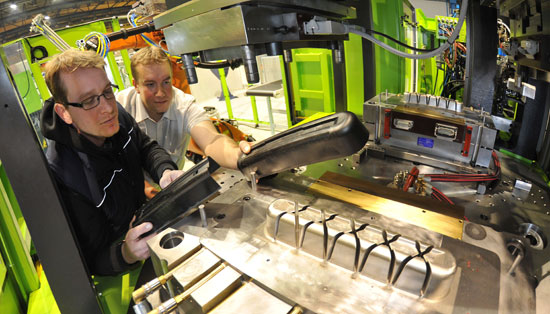 The Chair of Lightweight Structures and Plastics Processing at the Technical University of Chemnitz in Germany is taking a new approach to combining process technologies in the manufacturing of fibre-compound structural components.
The Chair of Lightweight Structures and Plastics Processing at the Technical University of Chemnitz in Germany is taking a new approach to combining process technologies in the manufacturing of fibre-compound structural components.ENGEL Austria supplied the matching turn-key production cell. At the end of January, the new ENGEL lightweight technology cell was inaugurated with representatives from industry and science in attendance in Chemnitz.
The use of thermoplastic fibre composite prepregs such as organic sheets is becoming increasingly important in lightweight automobile construction. The aim of current research is to develop processes that support economic viable processing of this fairly young class of materials, thus achieving large series capability. After ENGEL presented an initial system solution for economically viable production at the K fair last October, in the form of the ENGEL organomelt technology, the TU Chemnitz is now taking up this challenge as evidenced by its investment in the new lightweight technology cell. In collaboration with partners from the machine and plant engineering, automotive and aerospace industries, the scientists will be seeking to establish new production processes for thermoplastic fibre compound and also hybrid parts based on existing knowledge. ENGEL will be collaborating with the TU Chemnitz as a project partner.

The heart of the new production cell is an ENGEL insert 1800 H/500 L/400/90 injection moulding machine with an articulated arm robot, which ENGEL integrated with the plant. The production cell is characterised by a hitherto unique combination of prepreg and injection moulding module. The prepreg module is positioned as an additional clamping unit above the rotary plate on the vertical injection moulding machine. It moulds the fibre prepregs into the right shape for back injection.
"The plant enables us to implement closed and energy-efficient process chains for near-serial production of fibre reinforced structural components", says chair holder Prof. Lothar Kroll enthusing on the new possibilities. The plant supports a variety of process combinations such as injection-compression moulding, two-component injection moulding and microstructure foaming. The multiple axis robot acts as an interface to future automation solutions.
Against the backdrop of the inauguration ceremony at the ITC Industrial and Technology Park Heckert in Chemnitz, various test parts were moulded on the plant. The mould, too, was part of the ENGEL turn-key solution. The mould maker is ENGEL partner FKT Triptis.
More than 50 guests were able to experience the enormous potential of this innovative lightweight construction technology at first hand based on this example. They included numerous representatives of automobile manufacturers, system suppliers and plastics processors from all over Germany. A series of keynotes provided a framework for the event. Among others, Peter Egger, Head of Application Technology Large-Scale Machines, ENGEL Austria, talked about the machines and process technology behind the ENGEL organomelt technology.



